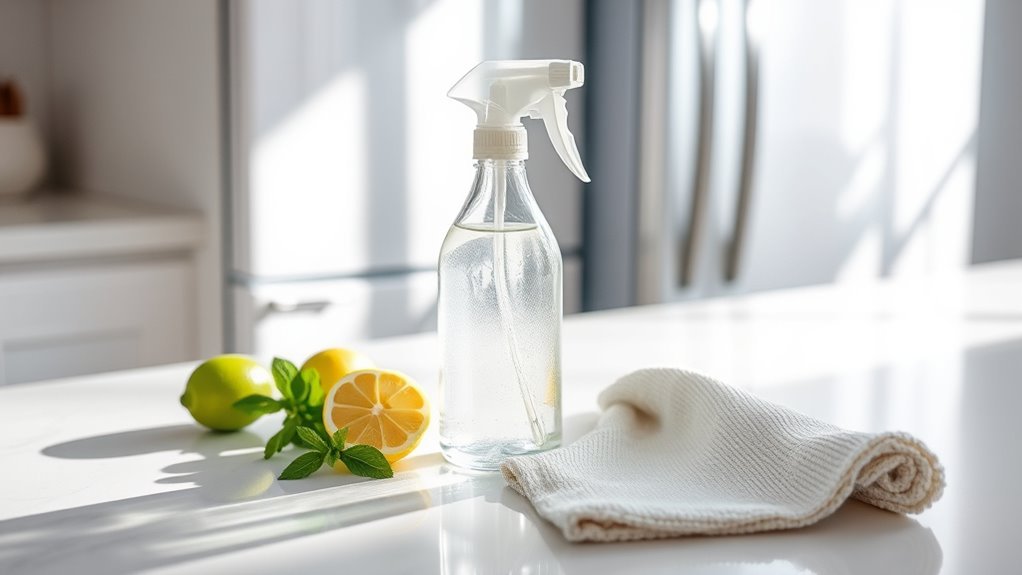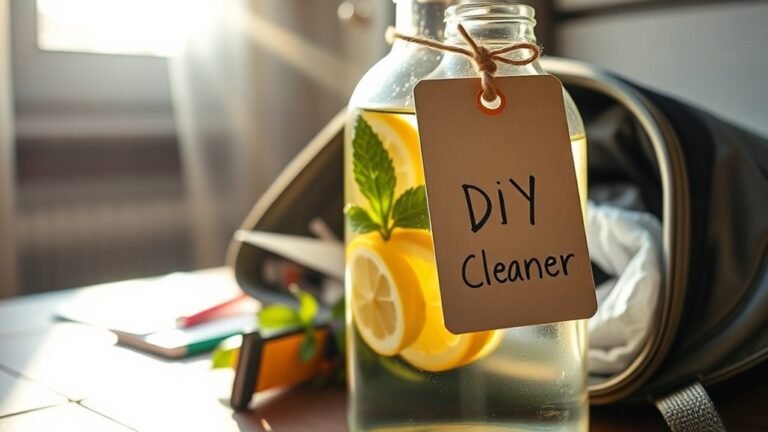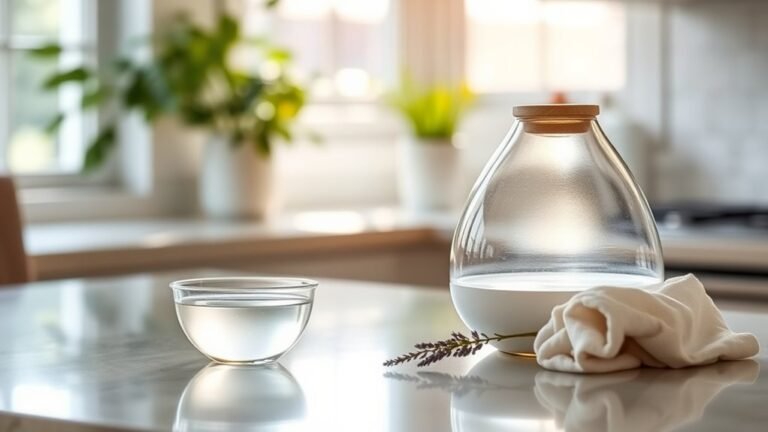DIY Cleaner for Refrigerator
You can easily make a natural DIY cleaner for your refrigerator using common ingredients like white vinegar, baking soda, and lemon juice. Mix equal parts vinegar and water in a spray bottle for a gentle disinfectant, and add a few drops of essential oil for scent. Use baking soda to absorb odors and scrub stains, while lemon juice helps break down grime and neutralize smells. This simple method keeps your fridge fresh and chemical-free; discover more tips to maintain it spotless and organized.
Benefits of Using Natural Cleaners for Your Refrigerator
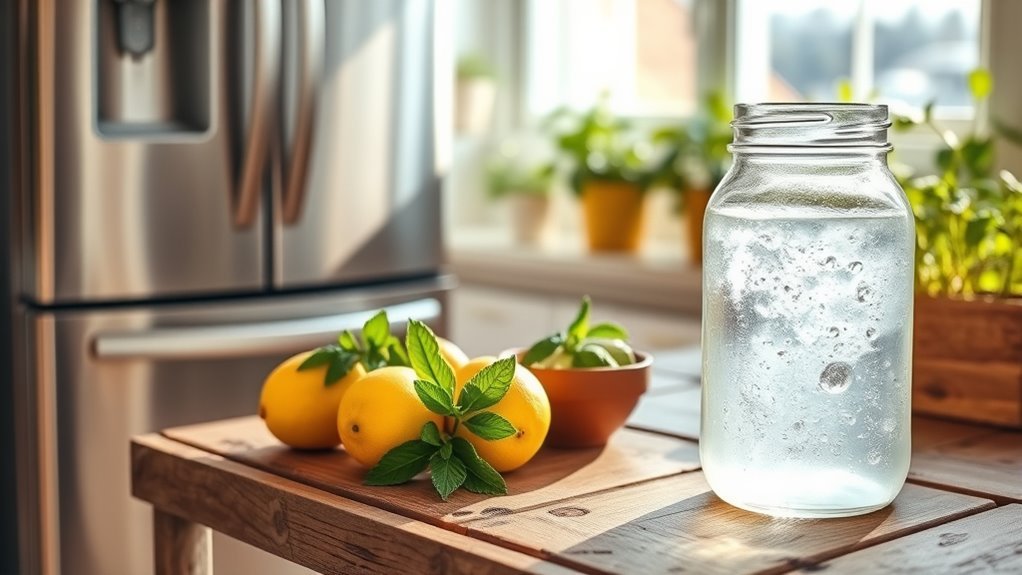
There are several advantages to using natural cleaners for your refrigerator, especially if you want a safe and effective way to maintain hygiene. Choosing eco friendly choices means you’re reducing harmful chemicals in your home, which promotes a healthier environment for you and your family. Natural cleaners often contain ingredients that are less abrasive, ensuring your refrigerator’s surfaces stay intact without harsh residue. This approach not only protects your appliance but also helps you avoid exposure to toxins that can affect your well-being. Plus, using natural cleaners aligns with a lifestyle focused on freedom—freedom from synthetic chemicals, waste, and environmental harm. By opting for these health benefits, you’re making a smart, responsible decision that supports both your personal care and the planet’s future.
Essential Ingredients for Homemade Refrigerator Cleaners
When making your own refrigerator cleaner, you’ll want to focus on natural cleaning ingredients that are both effective and safe. Common household items like baking soda, white vinegar, and lemon juice are excellent choices because they tackle odors and grime without harsh chemicals. Using these simple ingredients guarantees your fridge stays fresh and clean with minimal effort.
Natural Cleaning Ingredients
Although commercial cleaners are readily available, using natural ingredients for your homemade refrigerator cleaner offers a safer, eco-friendly alternative that’s just as effective. You can rely on simple, natural ingredients like white vinegar, baking soda, and lemon juice. These ingredients not only tackle grime and odors but also avoid harsh chemicals that might harm your health or the environment. White vinegar acts as a powerful disinfectant and deodorizer, while baking soda gently scrubs surfaces without scratching. Lemon juice adds a fresh scent and natural antibacterial properties. By choosing these eco friendly solutions, you maintain a clean fridge while reducing your ecological footprint. Using these natural ingredients empowers you to create a tailor-made cleaner that’s safe, efficient, and aligned with your values of freedom and sustainability.
Common Household Items
Every kitchen likely already holds the essential ingredients you need to make an effective homemade refrigerator cleaner. Common household items like white vinegar, baking soda, and lemon juice are your go-to essentials. White vinegar’s acidity cuts through grime and neutralizes odors, while baking soda gently scrubs without scratching surfaces. Lemon juice adds a fresh scent and boosts cleaning power with its natural acidity. When combined using simple cleaning techniques, these ingredients tackle stains and buildup effortlessly. You can mix vinegar and water for a spray solution or create a paste with baking soda and water for tougher spots. These household hacks save money, reduce chemical use, and give you freedom from commercial cleaners. Keep these staples handy, and your fridge will stay fresh and spotless with minimal effort.
Step-by-Step Guide to Making a Vinegar-Based Cleaner
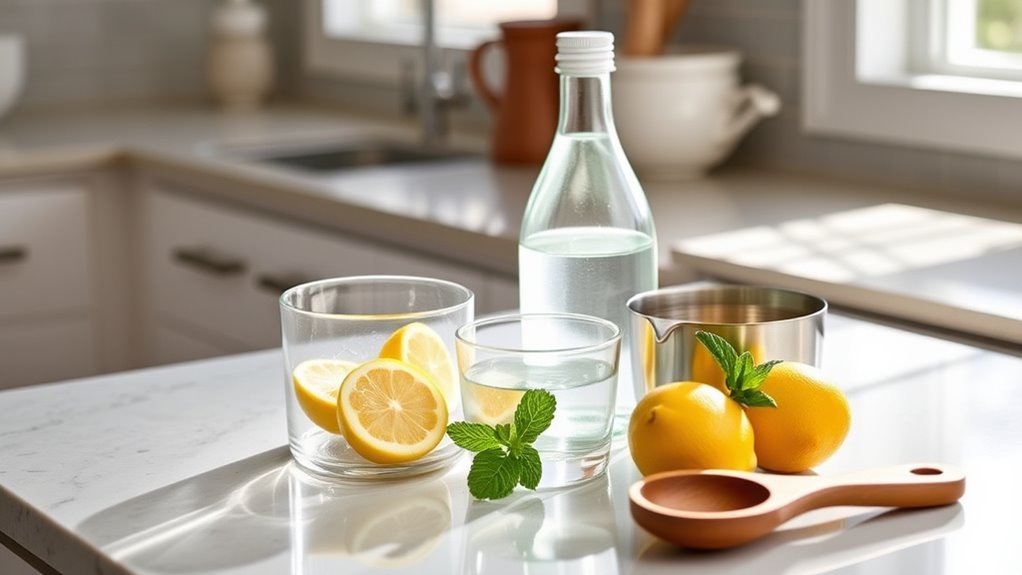
To make a simple vinegar-based cleaner for your refrigerator, you’ll need just a few common ingredients and tools. Start with one cup of distilled white vinegar—known for its natural antibacterial vinegar properties—and one cup of warm water. Mix these in a spray bottle for easy application. Vinegar serves as an effective eco friendly alternative to harsh chemical cleaners, breaking down grime while being safe for your health and the environment. Next, add a few drops of essential oil if you want a fresh scent. Shake the bottle gently to combine. When cleaning, spray the solution onto fridge surfaces and wipe with a soft cloth or sponge. This straightforward recipe lets you maintain a sparkling, chemical-free fridge with ease and freedom.
How to Use Baking Soda for Odor Removal and Cleaning
You can easily use baking soda to neutralize odors by placing an open box inside your fridge, which absorbs unwanted smells naturally. For cleaning, sprinkle baking soda on a damp cloth to gently scrub shelves and walls without harsh chemicals. This method is safe, effective, and keeps your refrigerator fresh and spotless.
Baking Soda Odor Absorption
One simple yet highly effective way to keep your refrigerator smelling fresh is by using baking soda. Its natural odor elimination properties make it an essential tool for tackling unwanted smells. To harness baking soda benefits, place an open box or bowl of baking soda on a shelf inside your fridge. This absorbs odors continuously, preventing them from spreading. Replace the baking soda every three months to maintain effectiveness. For stronger odors, sprinkle baking soda onto a damp cloth and gently wipe the fridge interior—this boosts odor absorption without harsh chemicals. Remember, baking soda works by neutralizing acids and bases, so it’s safe and eco-friendly. By regularly using baking soda, you free yourself from stubborn odors and enjoy a fresher, cleaner refrigerator environment.
Cleaning Refrigerator Surfaces
Besides absorbing odors, baking soda is also a gentle yet effective cleaner for refrigerator surfaces. To start, mix two tablespoons of baking soda with a quart of warm water. Use this solution to wipe down shelves, drawers, and walls, targeting sticky spots and stains. This method supports surface sanitization without harsh chemicals, keeping your fridge safe and fresh. Regular cleaning helps maintain ideal fridge organization by preventing buildup and lingering smells. After wiping, rinse with a clean damp cloth to remove residue and dry thoroughly. Baking soda’s mild abrasiveness tackles grime while preserving delicate surfaces, letting you clean with confidence. Incorporate this routine into your fridge maintenance to enjoy a clutter-free, odorless, and hygienic environment that empowers your freedom to store food safely and efficiently.
Safe and Natural Usage
Although baking soda is a simple household item, its safe and natural properties make it an ideal choice for odor removal and cleaning in your refrigerator. To use it effectively, sprinkle baking soda on a damp cloth to wipe down shelves and walls, eliminating residues without harsh chemicals. For odors, place an open box or a small bowl of baking soda inside your fridge; it naturally absorbs unpleasant smells, offering an easy, eco friendly solution. Replace the baking soda every three months to maintain freshness. By choosing baking soda, you embrace natural alternatives that protect your food environment and reduce exposure to toxins. This straightforward method lets you clean confidently while supporting a healthier home and planet, giving you freedom from synthetic cleaners and their potential risks.
Lemon Juice and Its Role in Refrigerator Cleaning
Using lemon juice is a simple yet effective way to clean your refrigerator. The natural acidity of lemon juice breaks down grime and food residues while leaving behind a revitalizing citrus freshness. You’ll appreciate lemon benefits like its antibacterial properties and ability to neutralize odors, making your fridge a cleaner, healthier space without harsh chemicals.
| Nutzen | Effect | Emotion Evoked |
|---|---|---|
| Antibacterial | Kills germs | Confidence |
| Deodorizing | Neutralizes smells | Relief |
| Natural | Non-toxic cleaning | Freedom |
| Fresh scent | Citrus freshness | Invigoration |
Tips for Maintaining a Spotless and Fresh Refrigerator
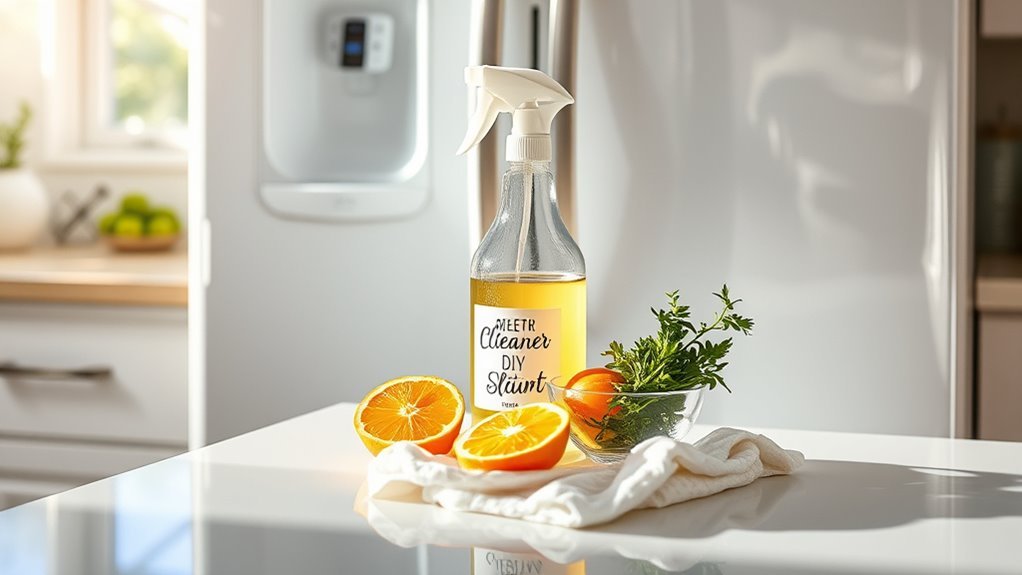
Lemon juice can give your refrigerator a fresh start, but keeping it spotless requires regular care and practical habits. Start by establishing a routine: clean spills immediately and wipe shelves weekly with a mild DIY solution. For effective refrigerator organization, use clear bins to separate food categories, making items easy to find and reducing clutter. Proper food storage is key—store leftovers in airtight containers and label them with dates to avoid waste and odors. Keep raw meats on the lowest shelf to prevent cross-contamination. Don’t forget to check expiration dates regularly and discard anything spoiled. By combining these habits with your lemon juice cleaner, your fridge will stay fresh, organized, and odor-free, giving you more freedom to enjoy your kitchen without hassle.
Safety Precautions When Using DIY Cleaning Solutions
Before you start applying any DIY cleaning solution in your refrigerator, it’s important to understand the safety precautions that will protect both you and your appliance. Prioritize DIY safety by using gloves to prevent skin irritation and guarantee good ventilation to avoid inhaling fumes. Always test your solution on a small, hidden area first to check for any adverse reactions. Avoid mixing cleaning agents, as this can create harmful gases. Use gentle, non-abrasive tools like soft cloths or sponges to prevent surface damage. Keep your DIY cleaning solutions out of reach of children and pets to prevent accidental ingestion. By following these cleaning precautions, you’ll maintain a safe environment while effectively keeping your refrigerator fresh and spotless. Your freedom to clean safely starts with informed, careful actions.
Häufig gestellte Fragen
Can DIY Cleaners Damage Refrigerator Seals or Components?
You might worry that homemade cleaners could damage your refrigerator seals or components, but if you use gentle, natural ingredients like vinegar or baking soda, you’re usually safe. Harsh chemicals or abrasive scrubbing can wear down seals, so it’s smart to test cleaners on a small area first. Regular refrigerator maintenance with mild solutions helps keep everything in good shape, letting you clean freely without risking damage.
How Often Should I Deep Clean My Refrigerator With Homemade Solutions?
Think of your fridge as a garden that needs regular tending to stay fresh. For frequency recommendations, deep clean it every three months to keep odors and bacteria at bay. Stick to a cleaning schedule that fits your lifestyle—maybe align it with seasonal changes. This practical routine guarantees your refrigerator stays a fresh haven, giving you the freedom to enjoy your food without worry or fuss.
Are DIY Cleaners Safe for Refrigerators With Stainless Steel Surfaces?
You can safely use DIY cleaners on stainless steel surfaces if you’re careful about surface protection. Avoid abrasive ingredients like baking soda or lemon juice directly on the steel, as they can cause scratches or dull the finish. Instead, opt for gentle solutions like diluted vinegar or mild dish soap. Always wipe with a soft cloth, following the grain of the steel, to keep your refrigerator looking sleek while enjoying the freedom of homemade cleaning.
Can I Store DIY Cleaning Solutions for Future Use?
Storing DIY cleaning solutions is like preserving homemade jam—if done right, they last longer but can spoil if neglected. You should consider the shelf life, which varies depending on ingredients; natural solutions often last a few weeks to months. For storage tips, keep them in airtight, labeled containers away from sunlight and heat. This way, you maintain their effectiveness and enjoy the freedom of ready-to-use, safe cleaners anytime.
What Are the Best Natural Cleaners for Mold Inside Refrigerators?
For tackling mold inside your refrigerator, you’ll want to use natural cleaners like white vinegar and baking soda—they’re effective and safe. Vinegar’s acidity helps kill mold spores, while baking soda deodorizes and scrubs away residue. To guarantee mold prevention, clean your fridge regularly, ideally every one to two weeks. Maintaining good cleaning frequency keeps moisture and mold at bay, giving you freedom from persistent mold problems and a fresher fridge environment.
